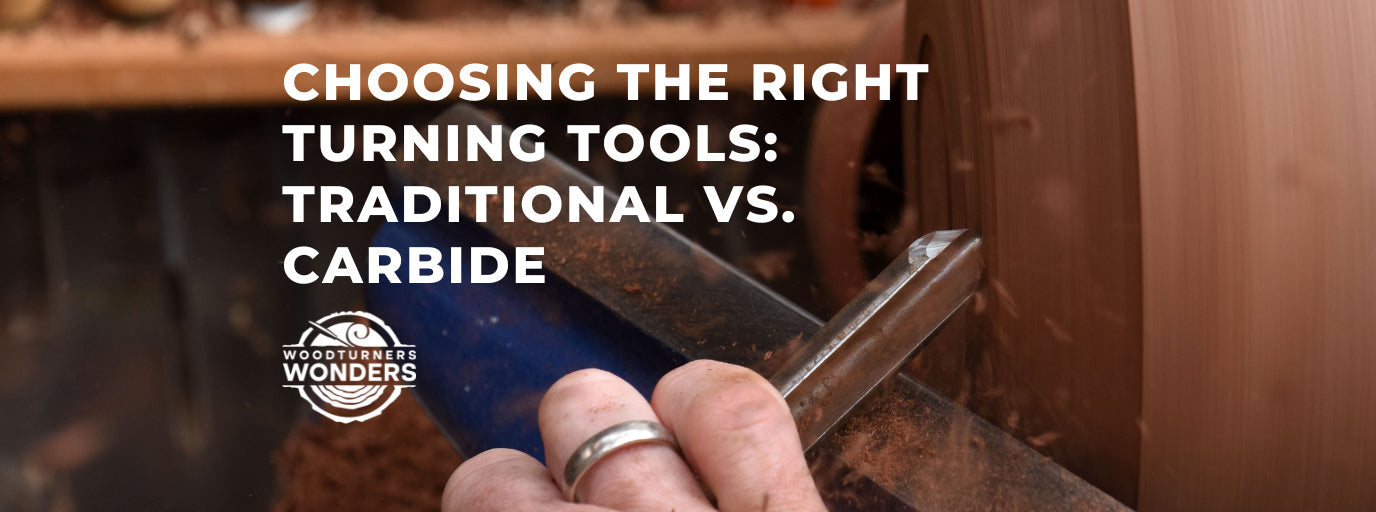
Choosing The Right Turning Tools: Traditional vs Carbide
Woodturning is a craft that blends artistry with precision, and selecting the right tools is crucial for achieving the best results. At WoodTurners Wonders, we offer a wide range of turning tools from renowned brands such as Robert Sorby, Crown Turning Tools, Easy Wood Tools, and Yellowhammer Turning Tools. Whether you're a novice or a seasoned turner, understanding the differences between traditional and carbide turning tools can help you make an informed decision. Here are some factors to consider when choosing your turning tools, along with a comparison of the pros and cons of carbide and traditional tools.
Factors To Consider When Choosing Turning Tools
1. Skill Level: Beginners may find carbide tools easier to use due to their low-maintenance nature, while traditional tools offer greater versatility and control, which can appeal to more experienced turners.
2. Maintenance: Consider how much time you're willing to invest in maintaining your tools. Traditional tools require regular sharpening, while carbide tools typically only need occasional replacement of the carbide inserts.
3. Material and Projects: The type of wood you work with and the projects you undertake can influence your choice. Traditional tools are often preferred for fine detail work, while carbide tools excel in roughing and removing large amounts of material quickly.
4. Budget: Evaluate the initial cost and the long-term investment. Traditional tools might have a lower upfront cost but require ongoing investment in sharpening equipment, whereas carbide tools have a higher initial cost but lower maintenance expenses.
Comparing Traditional & Carbide Turning Tools
Traditional Turning Tools
Pros:
- Versatility: Traditional tools come in a variety of shapes and sizes, allowing for a wide range of cuts and finishes.
- Control and Precision: Skilled turners can achieve intricate details and smoother finishes with traditional tools.
- Lower Initial Cost: Typically, traditional tools are less expensive upfront compared to carbide tools.
Cons:
- Maintenance: Requires regular sharpening, which can be time-consuming and necessitates additional equipment like sharpening stones or grinders.
- Learning Curve: Mastering traditional tools takes time and practice, as each tool and cut requires different techniques and angles.
Carbide Turning Tools
Pros:
- Ease of Use: Carbide tools are user-friendly and ideal for beginners due to their simplicity and reduced need for sharpening.
- Durability: The carbide inserts are long-lasting and can handle tough materials without frequent replacement.
- Low Maintenance: Instead of sharpening, you simply rotate or replace the carbide insert, saving time and effort.
Cons:
- Higher Initial Cost: Carbide tools are generally more expensive initially due to the cost of the carbide inserts.
- Limited Flexibility: While excellent for roughing and bulk material removal, carbide tools can lack the finesse required for fine detail work.
- Replacement Costs: Over time, the cost of replacing carbide inserts can add up, although this is often offset by the reduced need for sharpening equipment.
Making Your Decision
At WoodTurners Wonders, we understand that the choice between traditional and carbide turning tools ultimately depends on your individual needs, preferences, and budget. Brands like Robert Sorby and Crown Turning Tools provide an extensive selection of traditional tools known for their quality and craftsmanship. For those leaning towards carbide tools, Easy Wood Tools and Yellowhammer Turning Tools offer robust, user-friendly options that simplify the turning process.
Whether you're looking to refine your technique with traditional tools or prefer the convenience and durability of carbide, our diverse range ensures you'll find the perfect tools for your woodturning journey. Explore our collection and find the tools that will help you bring your creative visions to life.



Leave a comment